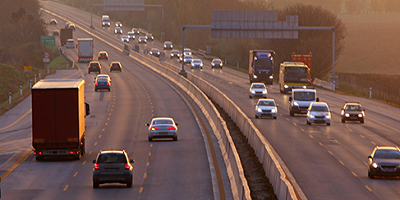Stay fire safe at home – get fully alarmed

From this month, several important changes to the laws covering smoke alarms, heat alarms and carbon monoxide (CO) alarms will come into force in Scotland. These changes, while only required by law in Scotland at present, highlight the importance of fire protection in every home and are well worth considering wherever you live. They won’t have an affect on your esure Home Insurance, so your cover is unaffected, and you don’t need to contact us about these changes.
Wake up to alarms
Every home in Scotland must now have interlinked smoke and heat alarms. Interlinked alarms provide added safety because, when one of them detects danger, they all go off together to raise the alarm throughout the home.
There must now be an alarm fitted in the room that is “used the most”, normally the living room . Additional smoke alarms must be installed in every hallway or landing, as that is where smoke tends to gather first. It’s a good idea to go further and fit smoke alarms in every room where a fire could start; for example, any room where you have candles burning or leave appliances plugged in and on at the mains
Kitchens are a little bit different though. The new law also states that a heat alarm, which is set off by a rise in temperature rather than the presence of smoke, must be installed in every kitchen. Smoke alarms are not recommended for kitchens because they are triggered too easily by steam or smoke from cooking. For the same reason, heat alarms are better for bathrooms too .
Homes that have fuel-burning appliances, such as a gas boiler, a log burner or an open fire, now require a carbon monoxide (CO) alarm in the room where the appliance is situated. The CO alarm does not need to be interlinked with other alarms.

Powered for life
Alarms that run on replaceable batteries are no longer legal in Scotland and must be replaced with mains powered alarms or those fitted with a sealed, tamper-proof, long-life (up to 10 years) battery . All smoke and heat alarms must be attached to the ceiling and not to a wall or a shelf.
Even if you live outside Scotland and have battery powered smoke, heat and CO alarms, it’s very important to check the battery life regularly. The Fire Brigade recommends once a week. If any of them are low, replace the battery immediately, or better still replace your alarms with mains powered ones, marked with a current British Standards or European (CE) safety mark and installed by a qualified electrician.
It is the property owner’s responsibility to ensure these new regulations are adhered to. If you rent a home in Scotland and your landlord is failing to comply, you can take your case to the Housing and Property Chamber.
Have a fire plan ready
Smoke and heat alarms save lives by giving everyone in the home vital extra time to escape in the event of a fire. The Fire Brigade also encourages every home to have an escape plan, so that when an alarm goes off, you and your family know exactly what to do.
Waking up to a house filling with smoke is frightening and confusing. It’s easy to become disoriented. By preparing and practising a fire escape plan, you can be much more confident of evading smoke and flames and getting out safely. Remember, some members of the household may need extra help.
Fire prevention
The best protection against fire is to stop it breaking out in the first place. Common causes of house fires are heaters placed too close to bedding, blankets or clothes, so keep heaters well away from flammable items.
To avoid the danger of CO leaks, heaters, gas boilers and solid fuel burning stoves or log burners should always be kept in good working order. Have them regularly serviced and chimneys swept by qualified professionals and place a CO alarm in the same room.

Be vigilant around naked flames. Candles may provide a lovely atmosphere in your home, but never leave them burning on their own for pets and children to knock over. Put them out fully when you leave the room. If you have an open fire, use a fireguard to stop sparks spitting out into the room and when you go to bed or go out, make sure the fire is under control and guarded.
Around 60 per cent of home fires start in the kitchen. When cooking, never leave pans unattended on the hob or grill. Always keep the oven, hob and grill as clean as possible since any build-up of fat and grease is likely to ignite and cause a blaze. When you’ve finished cooking, double-check the cooker and hob are turned off.
Faulty electrical appliances are a major cause of fires too. Don’t buy any appliance that doesn’t carry a British or European safety mark. Similarly, don’t cut corners with cheap chargers. Make sure electrical appliances, including chargers, are switched off at night.

Free advice from the professionals
You can find more advice on fire safety in the home from the London Fire Brigade. You can also contact your local fire brigade for a home fire safety visit. Most services run a free check and will even fit free smoke alarms while they’re there if you need them.
Share your fire safety knowledge with everyone in your home so they understand the rules of safety too.
You might also be interested in
Understanding your home cover and when it applies
Check out our video for top home cover tips
FCA changes to insurance and how they may affect your premium
The Financial Conduct Authority (FCA) – an insurance industry regulator – recently introduced new regulation to insurance pricing to take effect on 1 January 2022.

